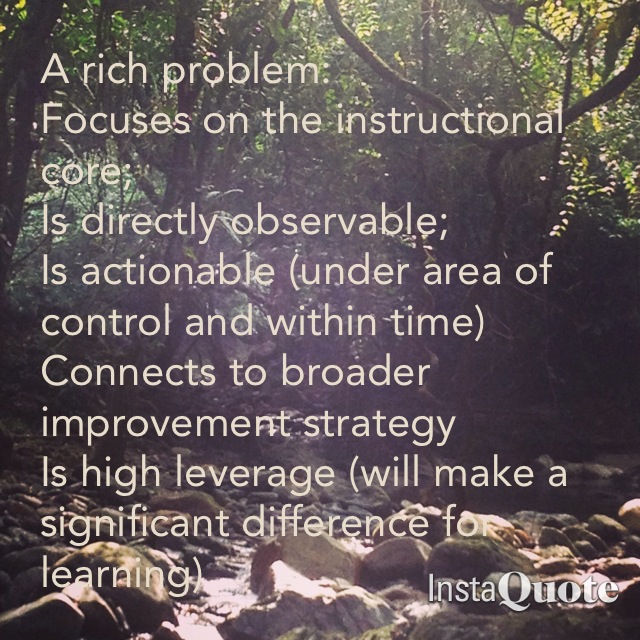A problem of practice
A problem of practice is:
"something you care about that would make a difference for student learning if you improved it." (City et al, 2009, p102)
The image below describes the key features of a rich problem of practice. It links to a powerpoint document that describes how a problem of practice is developed. Click on the link and start from slide 10. Take notes about what you think the key elements in developing a rich problem and using it are. What do we need to do?
"something you care about that would make a difference for student learning if you improved it." (City et al, 2009, p102)
The image below describes the key features of a rich problem of practice. It links to a powerpoint document that describes how a problem of practice is developed. Click on the link and start from slide 10. Take notes about what you think the key elements in developing a rich problem and using it are. What do we need to do?
Responses:
Has to be something we all are interested in or think is something that can and needs to be improved.
High leverage is key - the most impact and also specific enough for us to change. Needs to be within the parameters of our day to day teaching
Need to be willing to evaluate and adjust the problem of practice as we engage in the process.
Need to build up a good theory of action that relates to the problem of practice.
Everyone needs to be willing to engage with the problem of practice.
Needs to be something we can 'unpack' into more specific prblems to analyse/observe to guide observations/rounds.
A lot of discussion initially around refining the problem of practice so have a clear understanding of what needing to observe for.
Might take some time for us to refine and develop a problem of practice that is rich and effective.
Has to be something we all are interested in or think is something that can and needs to be improved.
High leverage is key - the most impact and also specific enough for us to change. Needs to be within the parameters of our day to day teaching
Need to be willing to evaluate and adjust the problem of practice as we engage in the process.
Need to build up a good theory of action that relates to the problem of practice.
Everyone needs to be willing to engage with the problem of practice.
Needs to be something we can 'unpack' into more specific prblems to analyse/observe to guide observations/rounds.
A lot of discussion initially around refining the problem of practice so have a clear understanding of what needing to observe for.
Might take some time for us to refine and develop a problem of practice that is rich and effective.
We will come back to this area later in the day when we consider what our problem of practice might be. Thinking time...
What are people doing in maths lessons?
What are people doing in maths lessons?

